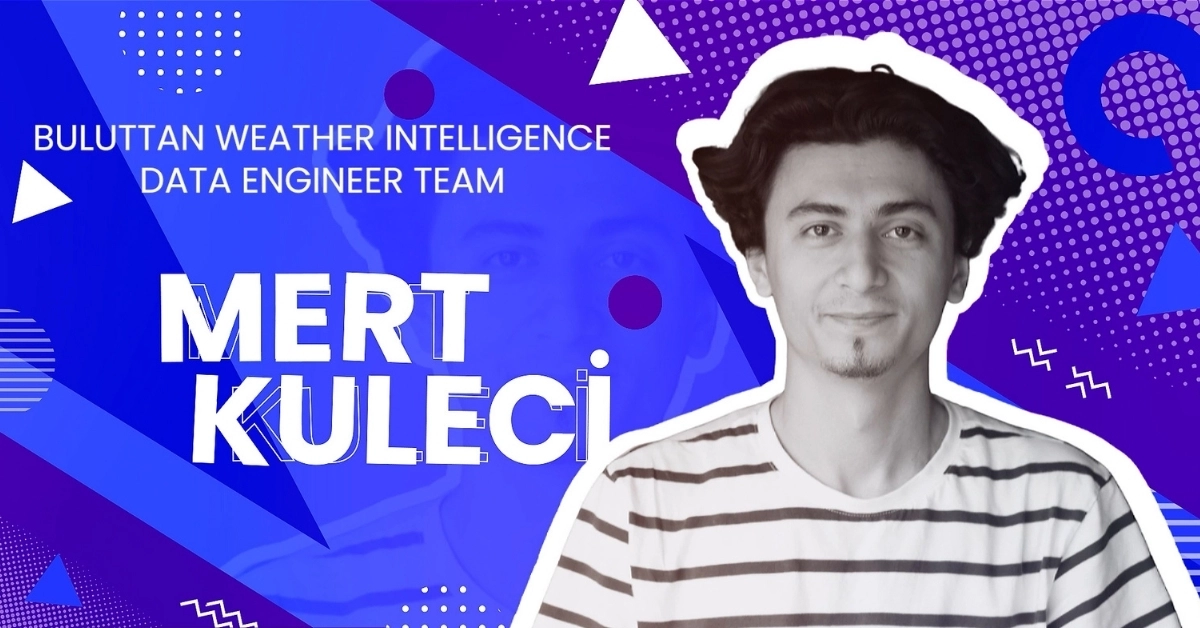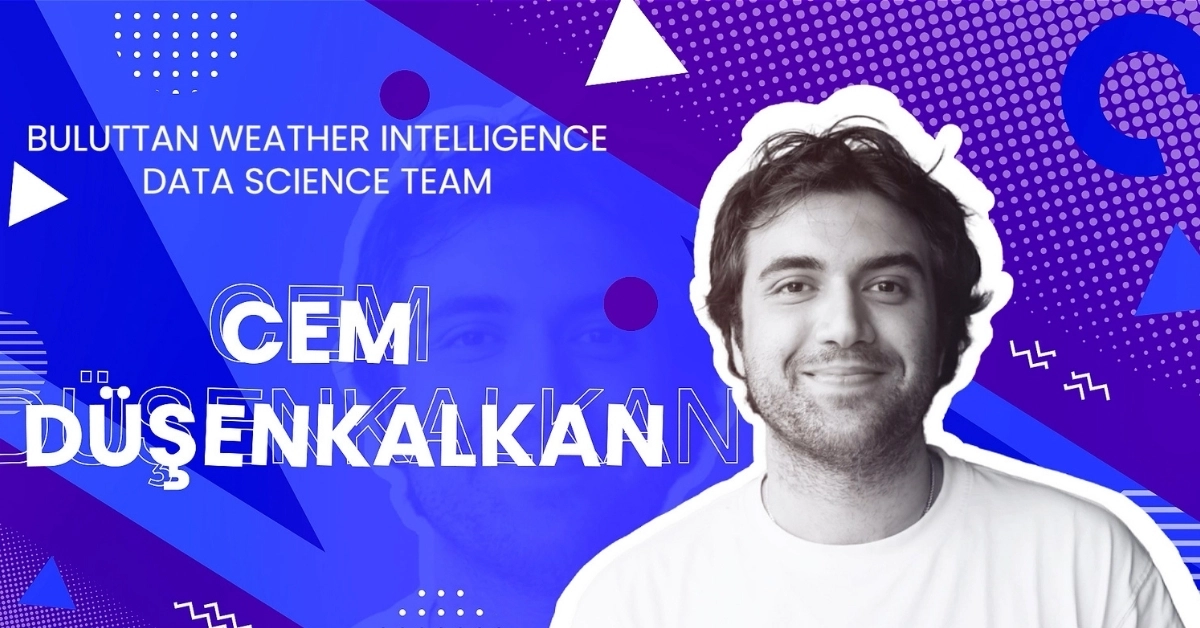Gökmen: Today, we are with Mert at Buluttan Small Talks. Welcome to Mert. We found it pleasant. What is going on? How are you?
Mert: I'm fine, how are you?
Gökmen: I'm fine too. Today we're actually going to get to know you. What does a little Mert do with Buluttan? How did his path cross with Buluttan? You work on the Data Engineering side. There may be some shares for those who are curious. Let's start with Mert. First of all, who is Mert?
Mert: Who is Mert? I think about that too. Let me put it this way. I just graduated from Sabancı University, from computer engineering. I entered in 2020 and finally completed the training. Actually, I am from Denizli. I came from Denizli to Istanbul for university. I've always been interested in computer science and engineering and that's why I chose this section.
In fact, I was also interested in industrial engineering, so I couldn't decide either way. I decided to read both. And I somehow crossed paths with Buluttan. I came to Buluttan after graduation. It's started well so far.
Gökmen: What are you doing right now?
Mert: I am currently in the Data Engineer team. As Engineer, we aim to incorporate the data we receive from outside into the company. We aim to make them more usable and to make more accurate predictions. Rather, we know, by adapting, cleaning, analyzing the information and data we receive in raw by adapting our own format, to make it usable, workable. I've been dealing with this kind of thing so far and I'm still in the learning phase.
Gökmen: Marvelous. You know you don't always stop learning. Data Engineering is also a crucial part of both the Weather Intelligence business and Buluttan. In fact, we are always as strong as data. We both measure our consistency and integrate that collected and processed data into our models, and our strength increases as we have more clean data, more quality data, and data in wider geographies and perspectives.
Therefore, it is one of the most valuable parties. So, what does Mert enjoy? He's a computer engineer, yes he works in the Data Engineering team, but other than that, you play football, I know that. What else is there? Well, he's already running Data Engineering at the company plus updates as an astroturf organizer.
Mert: I've been out of interest lately, but I love playing. I'm very interested in literature. I also had some struggles in college. I read a lot of books, I struggle to write something. Story vs. I write a lot. I love them. I am interested in cinema, I am interested in theater. I often watch movies and try to go to games. I play the piano. I love playing the piano.
Gökmen: Oh, I didn't know that. Marvelous.
Mert: I just learned not to play the piano, so I started taking lessons two years ago. I've come to a certain level. I hope I will continue to do so from now on. I'm trying to get used to Istanbul. Since our school was in a slightly more isolated place, we had less interaction. I'm just getting used to Istanbul. I'm learning how to live, new household things.
Gökmen: Yes to the environment, to the conditions. Marvelous. So how did your path cross with the Buluttan? I remember, of course, because it was very new. We'd like to hear a little bit about it. And as far as you can see, of course, it's a limited time. You're one of the new ones he's going to see. But what kind of people do you think can be happy here? What kind of people work? What is needed? From your point of view, you recommend it to new graduates or to people who are curious about clouds outside, weather intelligence, climate.
Mert: That's how I met Buluttan, so of course, I went through a certain job search process and I came across a lot from Buluttan here. I was intrigued by the company that the company does this, is interested in this, you can apply for such positions, I applied and I came here as a result of the processes. What I see here is a very dynamic environment.
People are very focused on how we can improve ourselves, how we can support each other, how I can improve myself, rather than the income of the company, and things are processed very quickly. When I ask for any help, I can get it very quickly. I can find options that can help right away. A little bit more, I think larger corporate companies are much slower processes. I liked this dynamism very much. I also have the opportunity to improve myself.
Gökmen: What did you find difficult? Let me ask you from the other side. Or something that needs to be improved, for example.
Mert: What I find difficult, is also something that may be good. But because we're a relatively small company, each individual weighs a lot, a lot more. In other words, when I make a small mistake, for example, its effect can be much more.
The multiplier effect happens a lot. In such cases, of course, we pay a lot of attention to validation. That's when I do a job, I consult my friend. How did this happen, didn't this happen, etc. In the ticky direction, I realized that the more effort individuals spend, the more they directly affect customer relations for both the company and their own profits. I've seen that it gives us more opportunities to show ourselves right now.
Gökmen: Of course, we are more or less a squad of 11 people. There are about 25 of us as a team, but no one has many gifts. Everyone is responsible for their own business, and as you said, the successes there and the mistakes there have a lot of impact with a multiplier effect. You are one of the most famous people with data. The data here has a power, but the power of the data here is in the air intelligence.
Data is a very powerful instrument, but it's also very heavy. We are dealing with a wide range of data, a wide variety of data. How do you see the cloud analytics and air intelligence industry in your experience so far?
Mert: I have observed that energy companies, especially airline companies, are very much in need of this kind of service. Because I saw that they needed much more in terms of some sanctions, practices and operational efficiencies, and that we were able to establish mutually positive relations. In terms of data, we depend on the weather, even when it will rain, whether we are in the sector or not, we need it in some way.
Especially companies that make money and spend money in the sector, of course, need a lot of Federal Intelligence. So far, we have been able to see that when they contact us and we provide them with a certain service, we receive feedback in a much more positive way. And in a way, we're trying to fight that data and increase its usability. For example, in a solar power plant, the amount of energy produced can change even according to the daytime time. There is no production at night anyway. And so that they can be predicted. It is very important that the data is clean and detailed.
Gökmen: Mert, thank you very much.
Mert: I recommend everyone to apply to both the Data Engineering team and other teams and try themselves. Frankly, I recommend applying to anyone who is interested in this field, who trusts their self-confident analytical intelligence, their personal cultivation intelligence, and their own motivation. I say everyone to be in the mood. I recommend it to all of you. It's a nice environment here and you're in the mood.
May your weather be nice!






